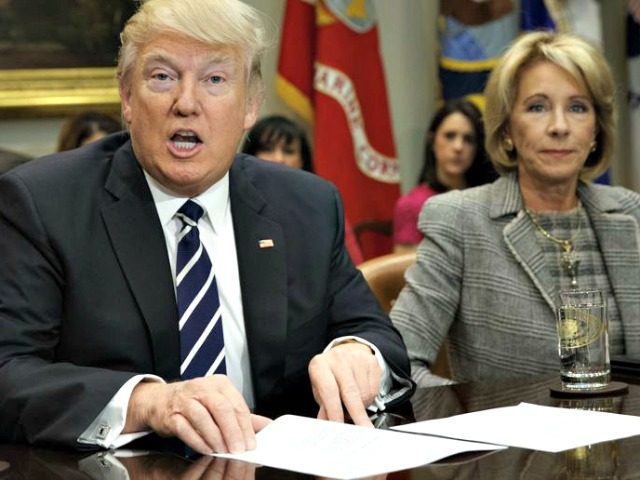President Donald Trump signed an executive order Wednesday that directed U.S. Education Secretary Betsy DeVos to review federal regulations that infringe upon state and local governments’ ability to enact education policy at the level closest to the American people.
“The executive order I’m signing today is another critical step to restoring local control, which is so important,” Trump said in his remarks at the signing of the Education Federalism Executive Order. “This executive order directs Secretary DeVos to review current federal regulations and ensure that they don’t obstruct the ability of states, local governments, teachers, and most importantly, parents, to make the best decisions for their students and, in many cases, for their children.”
The order states the education secretary “shall, as appropriate and consistent with applicable law, rescind or revise” any regulations or guidance documents “that are identified…as inconsistent with statutory prohibitions.” The secretary has 300 days to perform the review of regulations.
The president continued:
Previous administrations have wrongfully forced states and schools to comply with federal whims and dictate what our kids are taught. But we know that local communities do it best and know it best. The time has come to empower parents and teachers to make the decisions that help their students achieve success. That’s what this executive order is all about. So important.
Present at the signing of the executive order were Vice President Mike Pence, DeVos, and Govs. Kay Ivey (R-AL), Terry Branstad (R-IA), Paul LePage (R-ME), Brian Sandoval (R-NV), Gary Herbert (R-UT), Matt Mead (R-WY).
“As a former governor myself, I’ve always believed, as the President does, that education is a state and local function, and that decisions in education are best made by parents and teachers and local administrators,” Pence said. “The decisions over our children’s school should be made by parents and local administrators, not by politicians or unelected bureaucrats in a far, distant capital.”
DeVos said the federal Every Student Succeeds Act (ESSA) was “a good step in this direction, giving flexibility to states to best meet the needs of their communities.”
“We’re going to implement this law as Congress intended, not how the previous administration dictated,” the secretary added. “When we give decision-making power back to states and communities, students benefit. This executive order puts us on that track.”
Grassroots parent activists and education think tanks that have studied ESSA, however, say the federal law – even as passed in “bipartisan” fashion by establishment members of Congress and signed into law immediately by former President Barack Obama – anchors states to the controversial Common Core or its “rebrands” and still requires states to obtain the approval of the federal government for its education plans.
Quoting ESSA, American Principles Project senior fellow Jane Robbins and Indiana parent activist Erin Tuttle wrote at The Pulse 2016:
“Each State shall demonstrate that the challenging academic standards are aligned with entrance requirements for credit-bearing coursework in the system of public higher education in the State and relevant State career and technical education standards.”
“This is simply another way of saying states must have “college- and career-ready” standards,” the writers note. “And as made clear by the U.S. Department of Education’s own materials, “college- and career-ready” means Common Core.”

COMMENTS
Please let us know if you're having issues with commenting.